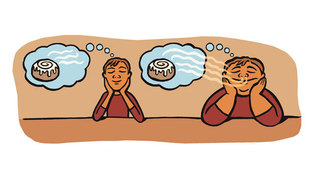 loading
loading
FindingsWhat your mind smellsCan your imagination affect your weight?  Gregory NemecView full imageThe smells of soap, aftershave, and fresh-baked cookies are easier for some people to conjure up mentally than for others. That difference in ability corresponds to body mass index (BMI), according to researchers at Yale’s John B. Pierce Laboratory. Postdoc Barkha Patel, psychiatry and psychology professor Dana Small, and their colleagues used questionnaires to ask 25 people of various body weights how often they experienced food cravings and how vividly they could imagine odors, visual images, and food-specific flavors and smells. Those with the highest BMIs turned out to be the most adept at imagining odors, even the odors of shampoo, aftershave, and the like. The finding was underscored by a second experiment in which 57 people took only the odor questionnaire. Furthermore, the participants who were best at imagining food flavors and smells were also the ones who said they experienced the most cravings. (The study appeared online in the journal Appetite in April.) It’s not yet clear whether imagination contributes to obesity or obesity somehow enhances imagination. But the heavier subjects’ skill with non-food smells suggests it’s the former. People with more body fat experience food cravings more often than others do, and mental imagery is thought to play a role. If future studies establish a causal link, new weight-loss strategies might emerge—like teaching people to distract themselves from thoughts of delicious smells. It could work the other way, too: underweight people, such as cancer patients, might be coached in mental imagery to help them eat more. “Cognitive approaches to weight loss are becoming increasingly popular,” says Patel, who points out that other researchers have successfully disrupted obese subjects’ visual imagination—and reduced cravings—by having them play the video game Tetris.
The comment period has expired.
|
|